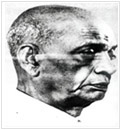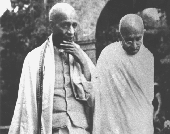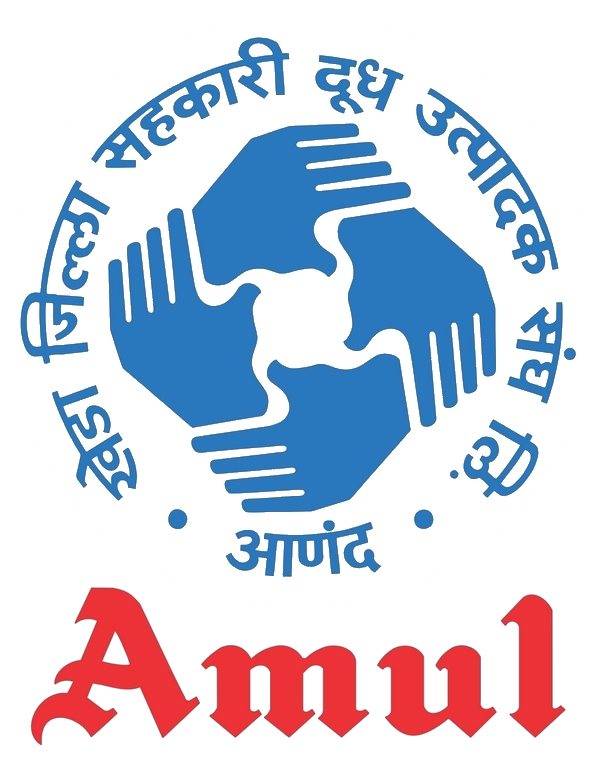
Sardar Vallabhai Patel 1875-1950
.jpg) Vallabhbhai Patel was born into a farmer family on October 31, 1875, in Nadiad, Kheda District, Gujarat, India. He was the fourth son of Jhaverbhai Patel and Ladba. Somabhai, Narsibhai and Vitthalbhai Patel were his elder brothers. Like his contemporaries in the Indian freedom movement, Gandhi and Jawaharlal Nehru, he also went to London to be trained as a barrister. He returned to India to become one of the leading lawyers in Ahmedabad, Gujarat. Inspired by Gandhi, he joined the freedom movement.
Vallabhbhai Patel was born into a farmer family on October 31, 1875, in Nadiad, Kheda District, Gujarat, India. He was the fourth son of Jhaverbhai Patel and Ladba. Somabhai, Narsibhai and Vitthalbhai Patel were his elder brothers. Like his contemporaries in the Indian freedom movement, Gandhi and Jawaharlal Nehru, he also went to London to be trained as a barrister. He returned to India to become one of the leading lawyers in Ahmedabad, Gujarat. Inspired by Gandhi, he joined the freedom movement.
.jpg) Sardar Patel’s first major participation was during the Kheda Struggle. The Kheda division of Gujarat was reeling under a severe drought and the peasants asked for relief from the high rate of taxes. When it was denied, Sardar Patel, Gandhi and others led the villagers in their refusal to pay taxes. Ultimately the government granted tax relief for that year resulting in the first major success for Sardar in his public life.
Sardar Patel’s first major participation was during the Kheda Struggle. The Kheda division of Gujarat was reeling under a severe drought and the peasants asked for relief from the high rate of taxes. When it was denied, Sardar Patel, Gandhi and others led the villagers in their refusal to pay taxes. Ultimately the government granted tax relief for that year resulting in the first major success for Sardar in his public life.
.jpg) When farmers were at the mercy of milk contractors in Kheda they turned to Sardar for a solution. Sardar Patel, who had advocated farmers’ co-operatives as early as 1942, reiterated his advice that they should market their milk through a cooperative society of their own. This co-operative should have its own pasteurization plant. His advice was that the farmers should demand permission to set up such a co-operative. If their demand was rejected, they should refuse to sell their milk to middlemen. Sardar Patel pointed out that in undertaking such a strike there should be some losses to them as they would not be able to sell their milk for some time. If they were prepared to put up with the loss, he was prepared to lead them.
When farmers were at the mercy of milk contractors in Kheda they turned to Sardar for a solution. Sardar Patel, who had advocated farmers’ co-operatives as early as 1942, reiterated his advice that they should market their milk through a cooperative society of their own. This co-operative should have its own pasteurization plant. His advice was that the farmers should demand permission to set up such a co-operative. If their demand was rejected, they should refuse to sell their milk to middlemen. Sardar Patel pointed out that in undertaking such a strike there should be some losses to them as they would not be able to sell their milk for some time. If they were prepared to put up with the loss, he was prepared to lead them.
The farmers’ deputation readily accepted his proposal. Sardar then sent his trusted deputy, Mr. Morarjibhai Desai, to Kaira District to organize milk cooperative – and a milk strike if need be. Mr. Desai held a meeting in Samarkha village on January4, 1946. It was resolved that milk producers’ co-operative societies should organize in each village of Kaira District to collect milk from their member-farmers. All the milk societies would federate into a Union which would own milk processing facilities.
.jpg) The Government should undertake to buy milk from the Union. If this wasn’t done, the farmers would refuse to sell milk to any milk contractor in Kaira District. The Bombay Government turned down the demand. The Farmers called a “milk strike” After 15 days the milk commissioner of Bombay, an Englishman, and his deputy visited Anand, Assessed the situation and accepted the farmers’ demand. This marked the beginning of Kaira District Co-operative Milk Producers’ Union Limited (later on popularly known as Amul). His strong leadership in the Bardoli (in Gujarat) struggle gave him the name “Sardar of Bardoli” and later just Sardar.
The Government should undertake to buy milk from the Union. If this wasn’t done, the farmers would refuse to sell milk to any milk contractor in Kaira District. The Bombay Government turned down the demand. The Farmers called a “milk strike” After 15 days the milk commissioner of Bombay, an Englishman, and his deputy visited Anand, Assessed the situation and accepted the farmers’ demand. This marked the beginning of Kaira District Co-operative Milk Producers’ Union Limited (later on popularly known as Amul). His strong leadership in the Bardoli (in Gujarat) struggle gave him the name “Sardar of Bardoli” and later just Sardar.
 Sardar’s most immediate concern was consolidation of the Indian princely states into the Union of India, which was accomplished bloodlessly except in the case of Hyderabad (Operation Polo) where he sent the army. His contribution to the unification of India made him known as the “Iron man of India”. He was the First Deputy Prime Minister and Home Minister of India. A man with great vision, freedom fighter and a Gandhian was recipient of innumerable awards in his life. He was also recipient of Bharat Ratna, the highest civilian award of the Nation.
Sardar’s most immediate concern was consolidation of the Indian princely states into the Union of India, which was accomplished bloodlessly except in the case of Hyderabad (Operation Polo) where he sent the army. His contribution to the unification of India made him known as the “Iron man of India”. He was the First Deputy Prime Minister and Home Minister of India. A man with great vision, freedom fighter and a Gandhian was recipient of innumerable awards in his life. He was also recipient of Bharat Ratna, the highest civilian award of the Nation.
For More Details www.sardarpateltrust.org
